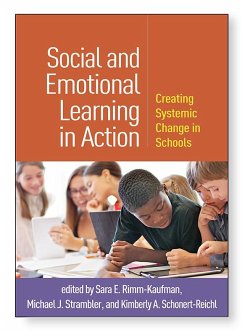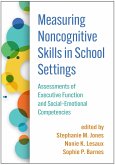Social and Emotional Learning in Action
Creating Systemic Change in Schools
Herausgeber: Schonert-Reichl, Kimberly A.; Rimm-Kaufman, Sara E.; Strambler, Michael J.
Social and Emotional Learning in Action
Creating Systemic Change in Schools
Herausgeber: Schonert-Reichl, Kimberly A.; Rimm-Kaufman, Sara E.; Strambler, Michael J.
- Broschiertes Buch
- Merkliste
- Auf die Merkliste
- Bewerten Bewerten
- Teilen
- Produkt teilen
- Produkterinnerung
- Produkterinnerung
Just because a school has adopted a social and emotional learning (SEL) program does not mean it will work. This book explores the conditions needed to implement, strengthen, and sustain effective SEL, and identifies paths that schools, districts, and states have taken to create those conditions. Major themes include equity of access to high-quality SEL, promoting interracial understanding in all school interactions, and enhancing the well-being and SEL skills of teachers and school leaders as well as students. Chapters describe exemplary initiatives that infuse SEL into classroom instruction,…mehr
Andere Kunden interessierten sich auch für
![The Development of Emotional Competence in Young Children The Development of Emotional Competence in Young Children]() Susanne A. Denham (United States George Mason University)The Development of Emotional Competence in Young Children69,99 €
Susanne A. Denham (United States George Mason University)The Development of Emotional Competence in Young Children69,99 €![Executive Skills and Reading Comprehension Executive Skills and Reading Comprehension]() Kelly B. CartwrightExecutive Skills and Reading Comprehension58,99 €
Kelly B. CartwrightExecutive Skills and Reading Comprehension58,99 €![Empowerment Evaluation and Social Justice Empowerment Evaluation and Social Justice]() David M. Fetterman (United States University of Charleston)Empowerment Evaluation and Social Justice52,99 €
David M. Fetterman (United States University of Charleston)Empowerment Evaluation and Social Justice52,99 €![Machine Learning for Social and Behavioral Research Machine Learning for Social and Behavioral Research]() Ross JacobucciMachine Learning for Social and Behavioral Research77,99 €
Ross JacobucciMachine Learning for Social and Behavioral Research77,99 €![The Construction of the Self The Construction of the Self]() Susan Harter (United States University of Denver)The Construction of the Self58,99 €
Susan Harter (United States University of Denver)The Construction of the Self58,99 €![Measuring Noncognitive Skills in School Settings Measuring Noncognitive Skills in School Settings]() Measuring Noncognitive Skills in School Settings58,99 €
Measuring Noncognitive Skills in School Settings58,99 €![Five Ways of Doing Qualitative Analysis Five Ways of Doing Qualitative Analysis]() Frederick J. Wertz (United States Fordham University)Five Ways of Doing Qualitative Analysis78,99 €
Frederick J. Wertz (United States Fordham University)Five Ways of Doing Qualitative Analysis78,99 €-
-
-
Just because a school has adopted a social and emotional learning (SEL) program does not mean it will work. This book explores the conditions needed to implement, strengthen, and sustain effective SEL, and identifies paths that schools, districts, and states have taken to create those conditions. Major themes include equity of access to high-quality SEL, promoting interracial understanding in all school interactions, and enhancing the well-being and SEL skills of teachers and school leaders as well as students. Chapters describe exemplary initiatives that infuse SEL into classroom instruction, administrative decision making, school-family-community partnerships, and teacher training.
Hinweis: Dieser Artikel kann nur an eine deutsche Lieferadresse ausgeliefert werden.
Hinweis: Dieser Artikel kann nur an eine deutsche Lieferadresse ausgeliefert werden.
Produktdetails
- Produktdetails
- Verlag: Guilford Publications
- Seitenzahl: 308
- Erscheinungstermin: 8. Mai 2023
- Englisch
- Abmessung: 177mm x 255mm x 18mm
- Gewicht: 592g
- ISBN-13: 9781462552047
- ISBN-10: 1462552048
- Artikelnr.: 66477406
- Herstellerkennzeichnung
- Libri GmbH
- Europaallee 1
- 36244 Bad Hersfeld
- gpsr@libri.de
- Verlag: Guilford Publications
- Seitenzahl: 308
- Erscheinungstermin: 8. Mai 2023
- Englisch
- Abmessung: 177mm x 255mm x 18mm
- Gewicht: 592g
- ISBN-13: 9781462552047
- ISBN-10: 1462552048
- Artikelnr.: 66477406
- Herstellerkennzeichnung
- Libri GmbH
- Europaallee 1
- 36244 Bad Hersfeld
- gpsr@libri.de
Sara E. Rimm-Kaufman, PhD, is the Commonwealth Professor at the School of Education and Human Development at the University of Virginia. Since 2000, she and her team have conducted research on schools with the goal of using evidence to improve the quality and equity of learning experiences. Dr. Rimm-Kaufman has studied a range of programs, including Connect Science, EL Education, Leading Together, Responsive Classroom, RULER, and Valor Collegiate and Compass, among others. She has authored more than 100 chapters, articles, and blog posts, yet she wrestles with the reality that researchers' extensive knowledge about social and emotional learning is rarely made accessible to educators. Michael J. Strambler, PhD, is Associate Professor of Psychiatry at the Yale University School of Medicine and Director of Child Wellbeing and Education Research at The Consultation Center at Yale, where he is also Senior Evaluation Consultant for YaleEval. Dr. Strambler's work focuses on the role of social environments in the academic, psychological, social, and behavioral well-being of children and youth. Much of his work occurs in the context of partnerships between researchers and practitioners, such as the Partnership for Early Education Research, which he directs among three Connecticut communities. Dr. Strambler is a recipient of the Kenneth B. and Mamie P. Clark Early Career Grant from the American Psychological Foundation and the Postdoctoral Award from the Ford Foundation. Kimberly A. Schonert-Reichl, PhD, is the NoVo Foundation Endowed Chair in Social and Emotional Learning and Professor in the Department of Psychology at the University of Illinois Chicago. Prior to her graduate work, she worked as a middle school teacher and as a teacher at an alternative high school for adolescents at risk. Dr. Schonert-Reichl is a recipient of the Janusz Korczak Medal for Children's Rights Advocacy; the EdTech Postsecondary Leader of the Year Award from MindShare Learning Technology; the Joseph E. Zins Distinguished Scholar Award from the Collaborative for Academic, Social, and Emotional Learning; and the Paz Buttedahl Career Achievement Award from the Confederation of University Faculty Associations of British Columbia.
Foreword
Aaliyah A. Samuel 1. Introduction: Meeting the Moment with Systemic SEL
Sara E. Rimm-Kaufman
Michael J. Strambler
& Kimberly A. Schonert-Reichl I. Supporting Systemic SEL 2. Increasing Equity in SEL for Students from Marginalized Populations
Tia Navelene Barnes
Jocelyn Easley Brown
Melissa Stoffers
Jurni Jackson
Yu Xia
Amanda G. Wells
& Alexcia Bryant 3. Striving for Racial Equity through Restorative Practices and SEL
Anne Gregory
Allison Rae Ward-Seidel
& Dionne Grayman 4. Integrating SEL into Textbooks and Instruction in Low- and Middle-Income Countries
Andy Smart
Jean Bernard
James H. Williams
Aaron Benavot
& Margaret Sinclair II. Fostering Adult SEL: Insights for Preservice Education and Professional Development 5. "What We Saw on the Wall": Adult Transformative SEL as a Lever for Equity and Excellence in Schools
Olivia A. Johnson
Bloodine Barthelus
Alexandra Skoog-Hoffman
Ednah Nwafor
& Robert J. Jagers 6. Cultivating SEL-Ready Teachers: SEL in Teacher Preparation
Deirdre Hon
Julie Sauve
Julia Mahfouz
& Kimberly A. Schonert-Reichl 7. Creating Spaces for Adult Learning and Professional Development: SEL Skills for Facilitating Racial Equity Discussions
Shannon B. Wanless
Caitlin F. Spear
Jocelyn V. Artinger
& Jennifer O. Briggs III. Cultivating Student SEL: Creating School Conditions Conducive to Skill Development 8. Cultivating Contexts of Interpersonal Skill Development among Diverse Students and Schools
Elise Cappella
Stacey Alicea
& Natalie May 9. Cultivating Students' Intrapersonal SEL Skills
Tyralynn Frazier & Brendan Ozawa-de Silva IV. Identifying Roadmaps for SEL in Action 10. The SEL Roadmap: Avoiding the Roadblocks
Ruts
and Dead Ends
Sheldon Berman
Jacqueline Jodl
& Joyce Barnes 11. Supporting Transformative SEL Implementation through a Collaboratory for Inclusion
Christina Cipriano
Gabrielle Rappolt-Schlichtmann
Julie M. Riley
Lauren Hunter Naples
& Abigail Eveleigh 12. Using Measurement and Continuous Improvement to Support SEL at the Classroom
School
District
and State Levels
Pilar Alamos
Jenna Lawrence Conway
Tamilah Richardson
& Amanda P. Williford 13. Conclusion: Trends
Challenges
and Future Directions in SEL
Michael J. Strambler
Kimberly A. Schonert-Reichl
& Sara E. Rimm-Kaufman Index
Aaliyah A. Samuel 1. Introduction: Meeting the Moment with Systemic SEL
Sara E. Rimm-Kaufman
Michael J. Strambler
& Kimberly A. Schonert-Reichl I. Supporting Systemic SEL 2. Increasing Equity in SEL for Students from Marginalized Populations
Tia Navelene Barnes
Jocelyn Easley Brown
Melissa Stoffers
Jurni Jackson
Yu Xia
Amanda G. Wells
& Alexcia Bryant 3. Striving for Racial Equity through Restorative Practices and SEL
Anne Gregory
Allison Rae Ward-Seidel
& Dionne Grayman 4. Integrating SEL into Textbooks and Instruction in Low- and Middle-Income Countries
Andy Smart
Jean Bernard
James H. Williams
Aaron Benavot
& Margaret Sinclair II. Fostering Adult SEL: Insights for Preservice Education and Professional Development 5. "What We Saw on the Wall": Adult Transformative SEL as a Lever for Equity and Excellence in Schools
Olivia A. Johnson
Bloodine Barthelus
Alexandra Skoog-Hoffman
Ednah Nwafor
& Robert J. Jagers 6. Cultivating SEL-Ready Teachers: SEL in Teacher Preparation
Deirdre Hon
Julie Sauve
Julia Mahfouz
& Kimberly A. Schonert-Reichl 7. Creating Spaces for Adult Learning and Professional Development: SEL Skills for Facilitating Racial Equity Discussions
Shannon B. Wanless
Caitlin F. Spear
Jocelyn V. Artinger
& Jennifer O. Briggs III. Cultivating Student SEL: Creating School Conditions Conducive to Skill Development 8. Cultivating Contexts of Interpersonal Skill Development among Diverse Students and Schools
Elise Cappella
Stacey Alicea
& Natalie May 9. Cultivating Students' Intrapersonal SEL Skills
Tyralynn Frazier & Brendan Ozawa-de Silva IV. Identifying Roadmaps for SEL in Action 10. The SEL Roadmap: Avoiding the Roadblocks
Ruts
and Dead Ends
Sheldon Berman
Jacqueline Jodl
& Joyce Barnes 11. Supporting Transformative SEL Implementation through a Collaboratory for Inclusion
Christina Cipriano
Gabrielle Rappolt-Schlichtmann
Julie M. Riley
Lauren Hunter Naples
& Abigail Eveleigh 12. Using Measurement and Continuous Improvement to Support SEL at the Classroom
School
District
and State Levels
Pilar Alamos
Jenna Lawrence Conway
Tamilah Richardson
& Amanda P. Williford 13. Conclusion: Trends
Challenges
and Future Directions in SEL
Michael J. Strambler
Kimberly A. Schonert-Reichl
& Sara E. Rimm-Kaufman Index
Foreword
Aaliyah A. Samuel 1. Introduction: Meeting the Moment with Systemic SEL
Sara E. Rimm-Kaufman
Michael J. Strambler
& Kimberly A. Schonert-Reichl I. Supporting Systemic SEL 2. Increasing Equity in SEL for Students from Marginalized Populations
Tia Navelene Barnes
Jocelyn Easley Brown
Melissa Stoffers
Jurni Jackson
Yu Xia
Amanda G. Wells
& Alexcia Bryant 3. Striving for Racial Equity through Restorative Practices and SEL
Anne Gregory
Allison Rae Ward-Seidel
& Dionne Grayman 4. Integrating SEL into Textbooks and Instruction in Low- and Middle-Income Countries
Andy Smart
Jean Bernard
James H. Williams
Aaron Benavot
& Margaret Sinclair II. Fostering Adult SEL: Insights for Preservice Education and Professional Development 5. "What We Saw on the Wall": Adult Transformative SEL as a Lever for Equity and Excellence in Schools
Olivia A. Johnson
Bloodine Barthelus
Alexandra Skoog-Hoffman
Ednah Nwafor
& Robert J. Jagers 6. Cultivating SEL-Ready Teachers: SEL in Teacher Preparation
Deirdre Hon
Julie Sauve
Julia Mahfouz
& Kimberly A. Schonert-Reichl 7. Creating Spaces for Adult Learning and Professional Development: SEL Skills for Facilitating Racial Equity Discussions
Shannon B. Wanless
Caitlin F. Spear
Jocelyn V. Artinger
& Jennifer O. Briggs III. Cultivating Student SEL: Creating School Conditions Conducive to Skill Development 8. Cultivating Contexts of Interpersonal Skill Development among Diverse Students and Schools
Elise Cappella
Stacey Alicea
& Natalie May 9. Cultivating Students' Intrapersonal SEL Skills
Tyralynn Frazier & Brendan Ozawa-de Silva IV. Identifying Roadmaps for SEL in Action 10. The SEL Roadmap: Avoiding the Roadblocks
Ruts
and Dead Ends
Sheldon Berman
Jacqueline Jodl
& Joyce Barnes 11. Supporting Transformative SEL Implementation through a Collaboratory for Inclusion
Christina Cipriano
Gabrielle Rappolt-Schlichtmann
Julie M. Riley
Lauren Hunter Naples
& Abigail Eveleigh 12. Using Measurement and Continuous Improvement to Support SEL at the Classroom
School
District
and State Levels
Pilar Alamos
Jenna Lawrence Conway
Tamilah Richardson
& Amanda P. Williford 13. Conclusion: Trends
Challenges
and Future Directions in SEL
Michael J. Strambler
Kimberly A. Schonert-Reichl
& Sara E. Rimm-Kaufman Index
Aaliyah A. Samuel 1. Introduction: Meeting the Moment with Systemic SEL
Sara E. Rimm-Kaufman
Michael J. Strambler
& Kimberly A. Schonert-Reichl I. Supporting Systemic SEL 2. Increasing Equity in SEL for Students from Marginalized Populations
Tia Navelene Barnes
Jocelyn Easley Brown
Melissa Stoffers
Jurni Jackson
Yu Xia
Amanda G. Wells
& Alexcia Bryant 3. Striving for Racial Equity through Restorative Practices and SEL
Anne Gregory
Allison Rae Ward-Seidel
& Dionne Grayman 4. Integrating SEL into Textbooks and Instruction in Low- and Middle-Income Countries
Andy Smart
Jean Bernard
James H. Williams
Aaron Benavot
& Margaret Sinclair II. Fostering Adult SEL: Insights for Preservice Education and Professional Development 5. "What We Saw on the Wall": Adult Transformative SEL as a Lever for Equity and Excellence in Schools
Olivia A. Johnson
Bloodine Barthelus
Alexandra Skoog-Hoffman
Ednah Nwafor
& Robert J. Jagers 6. Cultivating SEL-Ready Teachers: SEL in Teacher Preparation
Deirdre Hon
Julie Sauve
Julia Mahfouz
& Kimberly A. Schonert-Reichl 7. Creating Spaces for Adult Learning and Professional Development: SEL Skills for Facilitating Racial Equity Discussions
Shannon B. Wanless
Caitlin F. Spear
Jocelyn V. Artinger
& Jennifer O. Briggs III. Cultivating Student SEL: Creating School Conditions Conducive to Skill Development 8. Cultivating Contexts of Interpersonal Skill Development among Diverse Students and Schools
Elise Cappella
Stacey Alicea
& Natalie May 9. Cultivating Students' Intrapersonal SEL Skills
Tyralynn Frazier & Brendan Ozawa-de Silva IV. Identifying Roadmaps for SEL in Action 10. The SEL Roadmap: Avoiding the Roadblocks
Ruts
and Dead Ends
Sheldon Berman
Jacqueline Jodl
& Joyce Barnes 11. Supporting Transformative SEL Implementation through a Collaboratory for Inclusion
Christina Cipriano
Gabrielle Rappolt-Schlichtmann
Julie M. Riley
Lauren Hunter Naples
& Abigail Eveleigh 12. Using Measurement and Continuous Improvement to Support SEL at the Classroom
School
District
and State Levels
Pilar Alamos
Jenna Lawrence Conway
Tamilah Richardson
& Amanda P. Williford 13. Conclusion: Trends
Challenges
and Future Directions in SEL
Michael J. Strambler
Kimberly A. Schonert-Reichl
& Sara E. Rimm-Kaufman Index








